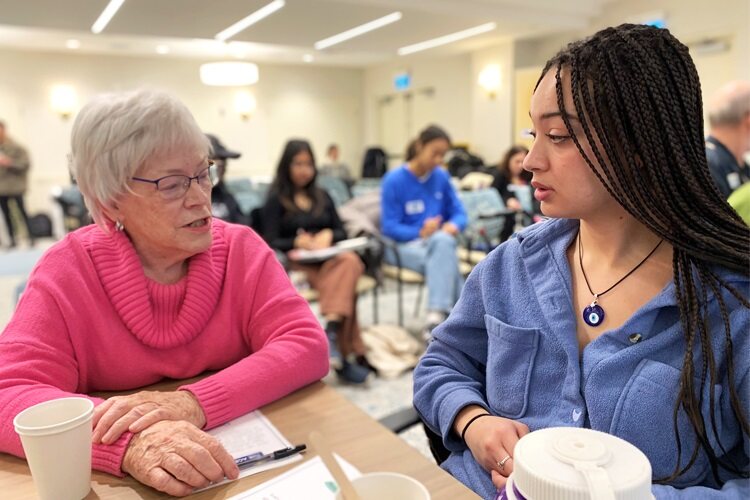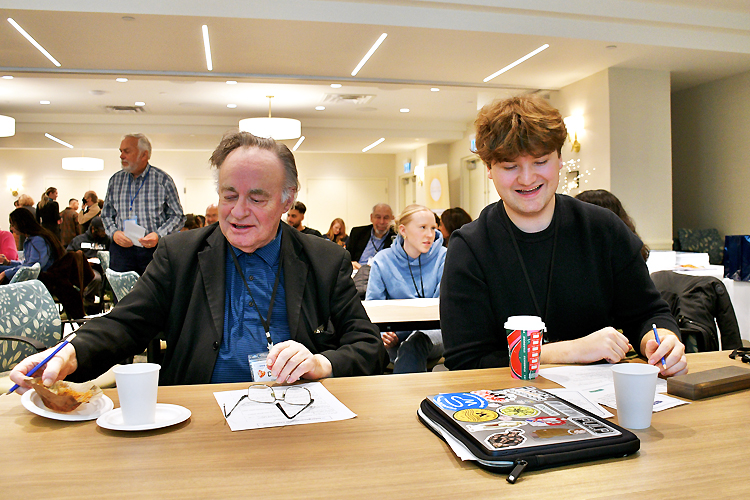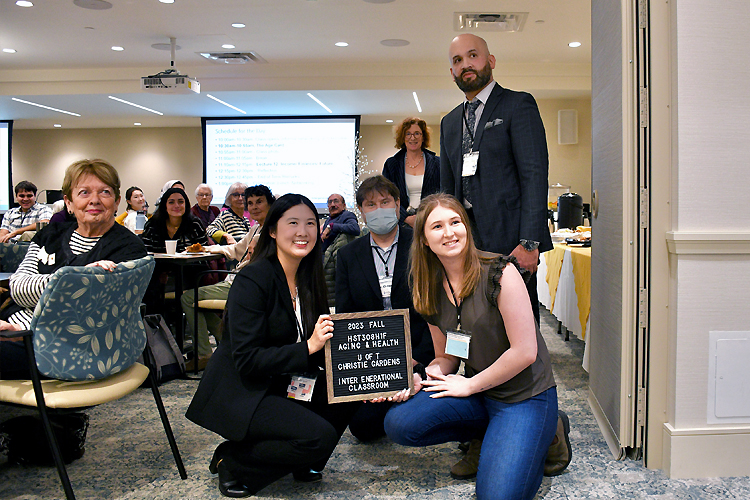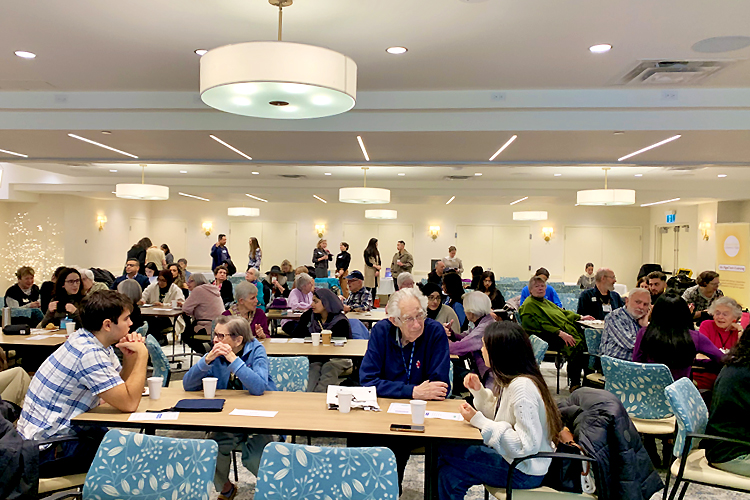This fall, the hottest ticket in town may not be the Taylor Swift concert — but a university course in which some students were already senior citizens when the millennial pop star was born.
Aging & Health (HST308H1) takes an in-depth look at issues faced by Canada’s senior population, dismantling many of the myths and prejudices attached to getting older. Part of the Health Studies program offered by the Faculty of Arts & Science, it’s taught by Raza Mirza, an assistant professor (status) with the Factor-Inwentash Faculty of Social Work.
A longtime speaker and consultant who’s spent his career improving the lives of senior citizens, Mirza started teaching the course in 2018. At one point, he began inviting older people to the class as speakers, in order to share their lived experience of aging with undergraduates.
But last year he had an idea: what if the students came to them?
After a conversation with Heather Janes, CEO of Toronto’s Christie Gardens residence, the revolutionary idea took shape. The classroom would no longer be on the St. George campus, but in a capacious room at Christie Gardens. Half of its learners would be regular undergraduates; the other half, residents in their 60s to 90s.

A visit to the Aging & Health class as it drew to a close last December shows that this is no ordinary class: muffins and coffee are served while teaching staff roam the class with microphones.
Most noticeable of all is that real dialogue is happening between the old and the young.
“I thought I would really have to act as a facilitator, but I didn’t need to do that,” says Mirza. “By the second week I’d walk into class and students were already chatting and making friends with each other.” Soon, older and younger students even started to socialize over tea outside of class.
Mirza’s interest in the world of aging started when he was young and surrounded by relatives of all ages. “I grew up in a multigenerational village,” he says. “My parents and their siblings all bought homes on the same street; we grew up with our grandparents, our older aunts and uncles, everyone supporting each other through good and bad times.”
At 26, finding himself in a classroom with students only a few years younger than he was, he felt the first pang of ageism. “A lot of preconceived notions about what we should or shouldn’t be doing at certain ages come from marketing and media,” he says. The result is that, before anyone does it to you, “you can become ageist towards yourself.”

Today, Mirza works to help senior citizens in many ways, most particularly as Director of National Partnerships and Knowledge Mobilization with the non-profit HelpAge Canada. He’s also founded an intergenerational initiative that facilitates home-sharing between older and younger people.
One of Aging & Health’s main aims is to dismantle traditional expectations people may have about the aging process. Sarah Deforest, a fourth-year member of University College majoring in health studies, calls her class experience “fantastic.”
“To be honest, I had some preconceptions about entering a predominantly white space as a young Black woman, but this environment has been incredibly welcoming. My friend Joanna and I talk about issues of race and class — and she reads all the same things I do!”
Joanna Taylor is a former front-line nurse and professor of nursing who’s still very much engaged with organizations dedicated to advocacy for seniors.
“Sarah and I have had such a lovely connection,” she says. “We’ll continue to see each other after the course finishes, because we like each other.” Apart from a place to make friends, Taylor sees Aging & Health as an investment in the future.

“It’s an opportunity to speak with people who will be entering the policy system,” she says. “It makes our experiences real to them, because we’ve lived all the things that are being discussed.”
William Wynne and David Clandfield found a similar kinship in class. Last December, Wynne was a fourth-year member of Trinity College majoring in health studies. Clandfield still teaches in the Department of French, was a founding member of the Cinema Studies program at the Faculty of Arts & Science, and is a former principal of New College.
Both men have close family members with dementia, and shared their experience as caregivers and relatives.
“Hearing David’s perspective on the subject really opened up my mind,” Wynne says. “This is what learning should be: having conversations that are organic and natural.”
In his long university career, Clandfield has always been interested in innovation. He thinks the class is a perfect example.

“I’ve long been invested in the idea of intergenerational learning and in what I call schools as community hubs,” he says. “It can apply just as well to university education as to the school system in general. I was very impressed with the way this class was organized. It also reminder that it’s not true that our generations are out of touch with each other.”
In this first intergenerational version of Aging & Health, discussions have not always been easy. “The Generation Gap” has perhaps never been wider than today, when housing, jobs and pension funds are scarce, and climate change is regularly blamed on behaviours of the past.
Still, “what was great about this class was that people said, ‘let’s look at solutions we can work on together’,” says Mirza. “The older people came to a place of realizing they’d never looked at issues through the eyes of the young. And the younger people started to see the the older versions of themselves.”
Though Aging & Health does deal with difficult issues such as bereavement, isolation and disability, it is far from negative in its perception of what it means to grow old. Here, students learn not to fear aging — seeing in real time how the “third act” can be the most interesting time of life: a period of freedom, reflection, learning, and continued social and political engagement.
It’s something William Wynne has definitely taken from the course.
“You look around this room, and you see so many people in love with life,” he says. “Each phase comes with its own challenges and its own benefits, and there are a lot of beautiful things in life that only come with age. It’s going to happen — so you may as well enjoy it.”

